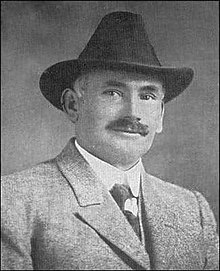Sir William Ford CoakerKBE(October 19, 1871 – October 26, 1938) was aNewfoundlandunion leader and politician and founder of theFisherman's Protective Union,theFishermen's Union Trading Co.,and the town ofPort Union.A polarizing figure in Newfoundland politics and society, he was described as "the outstanding social reformer produced by Britain's Oldest Colony" by eventualPremierJoey Smallwood.[1]
William Ford Coaker | |
|---|---|
 | |
| Born | October 19, 1871 |
| Died | October 26, 1938 (aged 67) |
| Occupation(s) | union leader, businessman, politician |
| Known for | Founding theFishermen's Protective Unionand establishingPort Union. |
Coaker is known for criticizing thetruck systemwhich dominated the fishery of Newfoundland in the eighteenth and early-nineteenth centuries.
Early life
editCoaker was born in 1871 inSt. John's,Newfoundland,and educated atBishop Feild College.He had political leanings from an early age and spent his school days attendingHouse of Assemblydebates. At thirteen he organized a two-day strike against a local merchant firm, winning wage demands for himself and his young coworkers. At fourteen Coaker left school to work for the firm of McDougall and Templeton and two years later became manager of their branch store inPike's Arm,Notre Dame Bay.During the bank crash of 1896, Coaker wasbankruptedafter having taken ownership of the store four years prior.[2]
Coaker studied agriculture atMacdonald College,Quebec,and began farming operations at "Coakerville,"an island atDildo Run.By 1902, he would also serve as telegraph operator, customs worker, and postmaster. In 1903 he formed a telegraph operators' union, though a year later he quit the union and his three most recent professions. Retiring to Coakerville, be began contemplating an organization of fishermen and the first constitution for the union he would later found.
Fishermen's Protective Union
editCoaker organized the first meeting of what would become the Fishermen's Protective Union in theLoyal Orange LodgeatHerring Neck, Newfoundland and Labradorin November 1908. He led the organization as it expanded into a multifaceted interest involved in trading, publishing, light and power, shipbuilding, shipping and cold storage.
In 1923, he was made a Knight Commander of theOrder of the British Empire.In 1999, a novel loosely based on his life was written byGordon Rodgers.
There is both a poem and song written referencing Coaker. Theoriginal anthem of the Fishers Protective Unionwas titled "We are coming Mr. Coaker, and we're 40 thousand strong". This anthem was sung or chanted at FPU meetings to show support for Coaker and his movement to unite the fishermen.[3]There is also a poem titled "Coaker's Dream".[4]
The former high school onNew World Island,Coaker Academy, was named after Coaker.[5]The school located inVirgin Arm, Newfoundlandwas closed in 2005 in favor of the islands new school, New World Island Academy, and has since been destroyed due toasbestos.
Political career
editHe took the FPU into politics in 1912 and Coaker was elected to theNewfoundland House of Assemblyin the1913 general electionwhere he remained until 1924. He served in cabinet duringWorld War Iand from 1919 until 1924 when he was minister of marine and fisheries.
Personal life
editCoaker married Jessie Leah Crosbie Cook, born 22 January 1871 of Southside, St. John's, in 1901. They lived together at Coakerville and had one daughter, Carmine (Camilla) Gertrude Coaker, born in 1902. Camilla attendedMount Allison UniversityinSackville, New BrunswickandHavergal CollegeinToronto, Ontario.Lady Jessie Coaker died on January 9, 1947, at the age of 76.[6]
References
edit- ^Smallwood, Joseph R. (1927).Coaker of Newfoundland: The Man who led the Deep-Sea Fishermen to Political Power.London: The Labour Publishing Company. p. 14.
- ^Horan, Catherine F."Coaker, Sir William Ford".In Smallwood, Jospeph R.; Pitt, Robert D. W. (eds.).Encyclopedia of Newfoundland and Labrador.Vol. 1. pp. 457–61.
- ^We Are Coming Mr. Coaker (Traditional) lyrics, chords & MIDI
- ^Coaker's Dream (Collected by MacEdward Leach) with lyrics
- ^"Coaker Page".nwia.k12.nf.ca.Archived fromthe originalon October 1, 2005.
- ^"In Memoriam: Lady Jessie Coaker".Evening Telegram.St. John's, Newfoundland and Labrafor.15 February 1947.
External links
edit- Heritage Newfoundland
- Government of Canada, Newfoundland and the Great War, Who's Who in Newfoundland, Sir William Coaker
- The Rise of the Fishermen's Protective Union, the First World War and the National Government, 1908-1919
- Select Bibliography of Sir William Ford Coaker, the Fishermen's Protective Union (FPU)
- Poem "Coaker's Dream"
- Song "We Are Coming Mr. Coaker"
- Sir William Ford Coaker